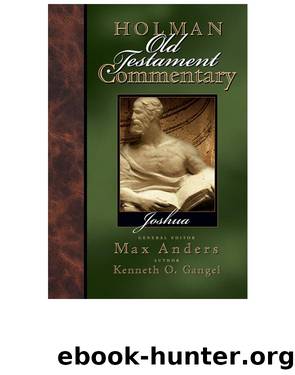Joshua by Max Anders

Author:Max Anders
Language: eng
Format: epub
Publisher: B&H Publishing Group
Published: 2010-02-03T16:00:00+00:00
V. PRAYER
* * *
Father, keep us from dealing deceitfully and treacherously with other people, especially in spiritual matters, and give us the wisdom to consult you when there seems to be any possibility that others have treated us in such a manner. Amen.
VI. DEEPER DISCOVERIES
* * *
A. Joshua 9 and Luke 16:8-9
This New Testament verse seems to shine back like a beacon on our Old Testament chapter to remind us of our vulnerability on earth. People who are spiritually minded are clearly less focused on worldly and material things and therefore âsitting ducksâ for those who approach them in a Gibeonite-like manner with deceit and treachery.
In this parable, a shrewd manager, though hardly the hero, teaches several basic lessons about our possessions. The parable has ended at verse 7 and the Lord's comments begin at verse 8 where he says:
The master commended the dishonest manager because he had acted shrewdly. For the people of this world are more shrewd in dealing with their own kind than are the people of the light. I tell you, use worldly wealth to gain friends for yourselves, so that when it is gone, you will be welcomed into eternal dwellings (Luke 16:8-9).
The first perspective is that of the rich man who acknowledges and even commends the manager's shrewdness. Again, we must not confuse shrewdness with stewardship. The Lord observes that worldly people show more shrewdness than Christians when it comes to âdealing with their own kind.â Bishop Trench once said of this parable that we should learn âthat the world is better served by its servants than God is by his.â
The second perspective of these verses reflects the Lord himself as he suggests that worldly possessions can be used to prepare for eternity. Obviously this is not a reference to buying salvation (1 Pet. 1:18) but using âworldly wealthâ for eternal goals. Shrewd businessmen constantly sacrifice comforts for future profits. Shrewdness in planning the Lord's work as well as one's life can certainly be taught from this passage.
The traditional rendering of the word here translates as âworldly wealth,â but it actually refers to more than money, including influence and positions as well. Apparently the Lord felt the disciples did not handle their resources properly, and he wanted them to become more astute in their stewardship.
Let's remember that principle. The parable should strike a familiar chord in our day. What does Western culture value at the beginning of the twenty-first century? Money, fame, beauty, power, position, titles, strength, visibility, and self-assertiveness. Virtually everything our society lusts after and pays exorbitant prices to obtain stands in contradiction to the values of God's Word. This parable of possessions reminds us again of the classic and poignant sentence once penned by Jim Elliott in his diary: âHe is no fool who gives up what he cannot keep to gain what he cannot lose.â
Download
This site does not store any files on its server. We only index and link to content provided by other sites. Please contact the content providers to delete copyright contents if any and email us, we'll remove relevant links or contents immediately.
Fangirl by Rainbow Rowell(9229)
How to Bang a Billionaire by Alexis Hall(8145)
Wonder by R. J. Palacio(8097)
The Thirst by Nesbo Jo(6932)
The Space Between by Michelle L. Teichman(6929)
Assassin’s Fate by Robin Hobb(6199)
Wiseguy by Nicholas Pileggi(5770)
The Night Circus by Erin Morgenstern(5217)
Paper Towns by Green John(5179)
The Kite Runner by Khaled Hosseini(5170)
Bittersweet (True North #1) by Sarina Bowen(4843)
Gerald's Game by Stephen King(4641)
Too Much and Not the Mood by Durga Chew-Bose(4337)
Pillow Thoughts by Courtney Peppernell(4271)
Goodbye Paradise(3799)
Twelve Days of Christmas by Debbie Macomber(3559)
Good by S. Walden(3548)
The Rosie Effect by Graeme Simsion(3460)
The Cellar by Natasha Preston(3334)
